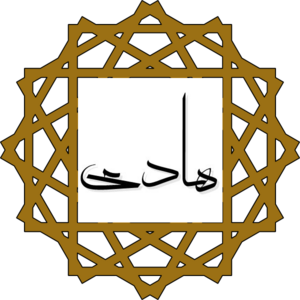Ali al-Naqi
|
Ali al-Hadi علي الهادي (Arabic) 10th Imam of Twelver Shia Islam |
|
|---|---|
 |
|
| Born |
c. 8 September 829 CE (5 Rajab 214 AH) Medina, Abbasid Empire |
| Died |
c. 1 July 868 (aged 38) (3 Rajab 254 AH) Samarra, Abbasid Empire |
| Cause of death | Death by poisoning according to most Shi'a Muslims |
| Resting place |
Al-Askari Mosque, Iraq 34°11′54.5″N 43°52′25″E / 34.198472°N 43.87361°E |
| Other names | Ali ibn Muhammad ibn Ali |
| Title |
List
|
| Term | 835 – 868 CE |
| Predecessor | Muhammad al-Jawad |
| Successor | Hasan al-Askari |
| Spouse(s) | (Hadīthah or Sūsan) or Salīl |
| Children |
Hasan al-Askari Muhammad Abdullah Jafar Zaki ibn Ali al-Hadi Ailia |
| Parent(s) | Muhammad al-Jawad |
Alī ibn Muhammad ibn ‘Alī (Arabic: علی بن محمد بن علی; 828-868 C.E. ) commonly called Ali al-Hadi and Alī an-Naqī was known as al-Hadi. He was the tenth of the Twelve Imams after his father Muhammad al-Jawad and before his son Hasan al-Askari. He remained in Medina teaching until the age of 30 when he was summoned to Samarra by the Abbasid caliph Al-Mutawakkil. There he was treated roughly by the caliph and his successors until, according to Shiite accounts, he was poisoned through intrigue of Al-Mu'tazz the Abbasid caliph, in 254/868, and was buried in Samarra.
According to the most accurate reports he was born in 828 in a village near Medina called Sorayya. to the ninth Shiite Imām, Muhammad al-Taqi, (also known as Imam Muhammad al-Jawad), and Lady Samānah or Susan, who was originally a Berber (from Northwest Africa). His father bestowed upon him the surname Abul-Hasan, after the surnames given to his grandfather Ali al-Ridha and his great grandfather Musa al-Kadhim. To differentiate between these three Abul Hasan, narrators usually call Musa al-Kadhim, abul Hasan the first, call Ali al-Ridha, Abul Hasan the second and call al-Hadi Abul Hasan the third.
After his father's death in 835, Ali al-Hadi assumed the official role of Imamate at the age of 7 or 8. The followers of his father were in agreement on his Imamate, except for a minor group who gathered around his older brother Musa who when dissociated himself from them, they turned to al-Hadi.Historians have mentioned that after his father's assassination at the will of Al-Mu'tasim, the Abbasid caliph ordered Umar bin al-Faraj to find a teacher in Medina for the young Imam (that must be one of the enemies of the Ahlul Bayt) in order to prevent Shiites from meeting him. He found al-Junaydi for this task, however, al-Junaydi often reported on the Imam's intelligence saying that the boy would provide perspectives on literature and understanding of the Quran and the revelations within. Al-Junaydi, impressed by him, concluded that it could only be by divine causes that the boy could be so knowledgeable, as a result, he dropped the animosity he had held towards the family of the prophet.
...
Wikipedia
